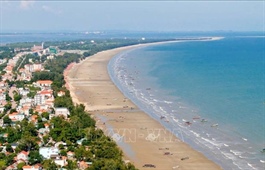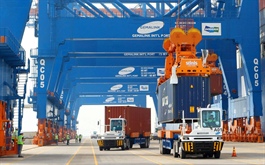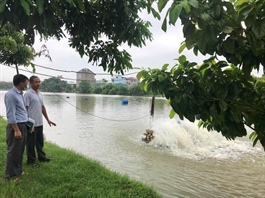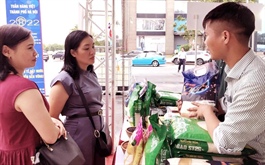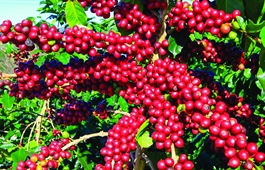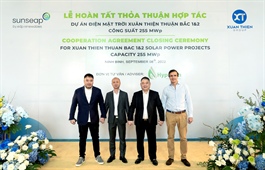Deep processing to develop the local agricultural products
Deep processing to develop the local agricultural products
Viet Nam's annual fruit and vegetable output has reached 31 million tonnes, but processing rates are only around 12 to 17 per cent. As a result, the processing industry only meets about 8 to 10 per cent of the fruit and vegetable output's annual output.

Experts said the lack of a processing industry had caused potential economic loss due to damaged fruits and vegetables after harvest.
Nong Ngoc Trung, Chairman of Golden Field Agriculture and Forestry Joint Stock Company, said: "A large agriculture industry without processing technology will be difficult for the consumption of agricultural products to succeed."
Accordingly, Trung said the application of deep post-harvest technology was key to reducing logistics costs, opening and accessing many markets worldwide, and increasing product value.
"For a long time, we often consume fruit products in fresh form. Meanwhile, transporting fresh fruit to the market faces many risks of loss, minimising economic value. When importing Vietnamese fruits, other countries must also carry out the processing. If we process products right at the raw material area, the economic value will certainly increase much higher," Trung said.
The director said the new drying technology was ten times cheaper than conventional technology and the output product has outstanding quality in colour and taste. For example, 11 kg of fresh dragon fruit cost VND7,000-VND10,000, then dried into one kg of finished product, priced at $15 or VND300,000.
He added: "Dried fruit can be preserved for 24-36 months compared to only ten days of fresh fruit, giving businesses plenty of time to access the global supply chain."
To solve the problem of consuming post-harvest products and meeting fastidious markets, Trung's company owns a versatile drying technology, helping to diversify products and increase consumption time for products from agriculture to the fishery.
In particular, he said the drying system can be completely transported by container, easily transported across areas, even to remote areas. In addition, thanks to the advanced sterilisation drying technology, fully controlled by 4.0 technology with a drying temperature range of 0-85 degrees Celsius, the company can dry 5-7 tonnes of agricultural products within 24 hours.
Trung told local media: "Our technology is well received and appreciated by many customers in Germany, the Netherlands, Australia, the US, China, and Korea."
Earlier, Phuc Ha Juice Company Limited worked with Trung's company to form a storage and processing area for dried dragon fruit with more than 600 tonnes of fresh fruit per month, creating stable jobs for local workers.
Le Thi Nguyen Ha, Director of Phuc Ha Juice Co., Ltd., recognised the importance of investing in processing technology for fruit, saying: "Modern processing brings high economic value and increases income for farmers."
Sales Director of Sasaki Vietnam Dang Tran Viet said refrigeration drying technologies were also a new trend to bring higher product quality with low production costs and high efficiency as well as environmental friendliness. Moreover, post-harvest agricultural products could retain their delicious taste, colour, smell and taste thanks to this technology.
Ngo Quang Tu , a representative of the Department of Agricultural Products Processing and Market Development (MARD), said more than 76 per cent of exported fruits and vegetables had not been processed. As a result, the consumption is still in the form of fresh or preliminarily processed and preserved, leading to very high post-harvest losses and high spoilage rates in transit and during consumption.
He considered the poor post-harvest preservation process and lack of minimal equipment such as electricity, water, and cold storage are reasons for the losses.
Expanding processed products from agricultural products
With five years of experience in the fruit processing industry in Viet Nam, representative of Andros Company Asia, Valentin Tran, said that the firm was trying to build a chain of production and consumption of fruit products in Tien Giang and the safe material areas with Global GAP certification in provinces such as An Giang and the central highlands area.
Fruits will be processed into finished products such as jams, ingredients for making drinks, cakes, bottled water, and fruit products for children, then exported to the European market.
Tran said that he processed 20,000 tonnes of fresh fruit each year and exported more than 40,000 tonnes of processed fruit to foreign markets.
Tran said that Vietnamese fruit had a lot of potential for development in foreign markets because it possesses many advantages in terms of varieties, product quality and good price, adding the deep production of fresh fruit into other materials will increase the product's value.
Tran said that for domestic fruit to go further, it was necessary to improve product quality and change traditional farming habits to sustainable farming to avoid the problem of good harvest resulting in devaluation.
Le Duy Toan, director of Duy Anh Food Company Limited (HCMC), uses post-harvest agricultural products to process into various types of vermicelli and rice paper, creating surprises and attraction for the Japanese and Korean markets.
Toan's firm has more products made from other agricultural products, such as coffee vermicelli, sweet potato vermicelli, moringa vermicelli, spinach noodles, beetroot noodles, pumpkin noodles, black sesame noodles and carrot noodles.
Director of the Institute of Agricultural Mechatronics and Post-Harvest Technology, Pham Anh Tuan, said: "Although the application of post-harvest technology to preserve and process products has been applied by many units, the situation of good harvests resulting in devaluation still recurs."
As more than 80 per cent of establishments have less than VND2 billion capital, while the loan mechanism and policy are not suitable for 80 per cent of these small and medium enterprises, it is also trouble for the development.
Therefore, to increase the value of post-harvest agricultural products, it is necessary to reorganise production and material areas to promote chain production to ensure raw materials for processing, according to experts.








